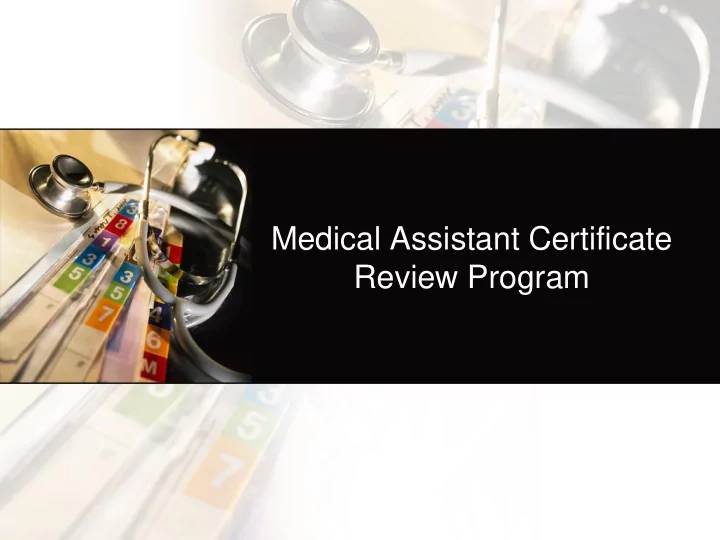

Medical Assistant Certificate Review Program
Medical Assistant Certificate Review Team Members • Kathleen Welch Hudson - Department Chair Healthcare Technology and Ambulatory Services • Cecelia Sederman- Faculty, Medical Assistant Program • Brenda Salines - Faculty, Phlebotomy Certificate Program • Practice Director, Women’s Health Ann Mairie Tinkham- Center Haverhill, MA • Emily Gonzalez Faculty, Science Department
Medical Assistant Certificate Review • Mission Statement – The Mission of the Medical Assistant Certificate Program is to prepare competent, entry level medical assistants, who will function professionally in all aspects of ambulatory/outpatient healthcare and meet the employment needs of the Greater Merrimack Valley Area.
What are Medical Assistants? Clinical Skills Administrative Skills • Taking medical histories • Using computer applications • Explaining treatment procedures to patients • Answering telephones • Preparing patients for examination • Greeting patients • Assisting the physician during the exam • Updating and filing patient medical records • Collecting and preparing laboratory specimens • Coding and filling out insurance forms • Performing basic laboratory tests • Scheduling appointments • Instructing patients about medication and • Arranging for hospital admissions and special diets laboratory services • Preparing and administering • Handling correspondence, billing, and injections/immunizations as directed by a bookkeeping physician • Authorizing prescription refills as directed • Drawing blood • Taking electrocardiograms • Removing sutures and changing dressings
College Mission and Core Values • The Medical Assistant Program facilitates the accomplishment of the college’s mission and core values: • Collaboration-Our program has over 38 clinical affiliations with medical offices and hospitals throughout the Merrimack Valley. • Diversity-The Medical Assistant Program accepts all qualified applicants and strives to recruit applicants that mirror the diverse multicultural and ethnic backgrounds of the community.
Institutional Strategic Plan • Resource to the community – The Medical Assistant Program has been involved in several Community Service/Service Learning activities within the community over the last for years. – The program has worked with La Esperanza, a girls’ charter school in Lawrence. The NECC students assisted the volunteer school nurse to perform vision and hearing screenings for over 100 students. – We are completing our second year with Emmaus House, a homeless shelter in Haverhill. Here our students have cooked and served dinners once a month and conducted run blood pressure clinics and provided patient education. – In collaboration with the City of Lawrence and Greater Lawrence Family Health Center our students participated in the city wide health fair, by performing blood pressure screenings.
Strengths of our program • Faculty – We have highly qualified and dedicated faculty teaching in this program. – Faculty in this program have many years of clinical and administrative experience. – Faculty have earned Masters’ in Nursing, Human Services, Education and Biology. – Faculty maintain their expertise by attending continuing education classes and working in hospitals and medical practices.
Strengths of program • Community Service/Service Learning – Caring faculty and students are dedicated to giving back to the community. – Ongoing projects include La Esperanza, Emmaus House, Hillview Montessori School, City of Lawrence Health Fair
Strengths of program • High Demand for the Program – This program responds to the needs of the community – Medical Assistants is one of the top 30 fastest growing jobs in the country through the year 2016, according to the Department of Labor • Diversity of students – The Medical Assistant Program represents the ethnic diversity of the community we are located in. – We are predominately female and in terms of minority enrollment, percentages of the program approximate those of the college.
Strengths • Curriculum – Curriculum is sequentially ordered to ensure student success. – Program proficiencies and pre-requisites are designed to assure that students follow the prescribed sequence. – The students are presented with concepts that progress from simple to more complex
Weakness • Pass rate of CMA exam – Students after the completion of certificate program are allowed to take the National Certification Exam. – Our pass rate from 2002-2008 averaged 82% – The National benchmark for the certification exam pass rate is set at 70% – Pass rate in 2009 was 59%.
Weaknesses • Low graduation rate of part-time evening students – Part-time evening program began in 2006 – Three year average of students graduating from this program is seven (7). – These numbers will require further investigation.
Weaknesses • Increase participation of advisory board members – Many of our board members are from our clinical affiliates. – Over the last several years attendance at meetings has been low due to a variety of circumstances. – Traditionally meetings have been held in the evening on the Lawrence Campus. – We have tried morning meetings on the Haverhill campus and the numbers did not change significantly.
Weaknesses • Need for a full time faculty member – Currently only one half time position is dedicated to day and evening programs which is insufficient for student advising and teaching. • Need for additional laboratory space – Currently share lab space with the phlebotomy program on the Lawrence Campus. – Issues with current laboratory space: • Room size is too small for the number of students in the program. • Heating and air conditioning problems.
Summary • The Program Review is a way to reflect more holistically on program strengths, challenges and opportunities • We feel that through this program review, we have made great strides to strengthen this program and identify areas of improvement.
And for a change of pace • httwww.youtube.com/watch?v=RP4abiHdQpc&feature=player_det ailpagep://
Recommend
More recommend